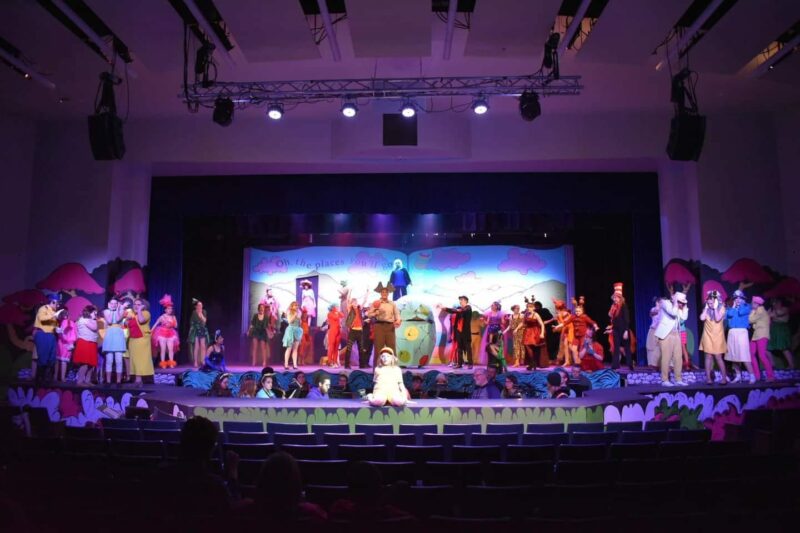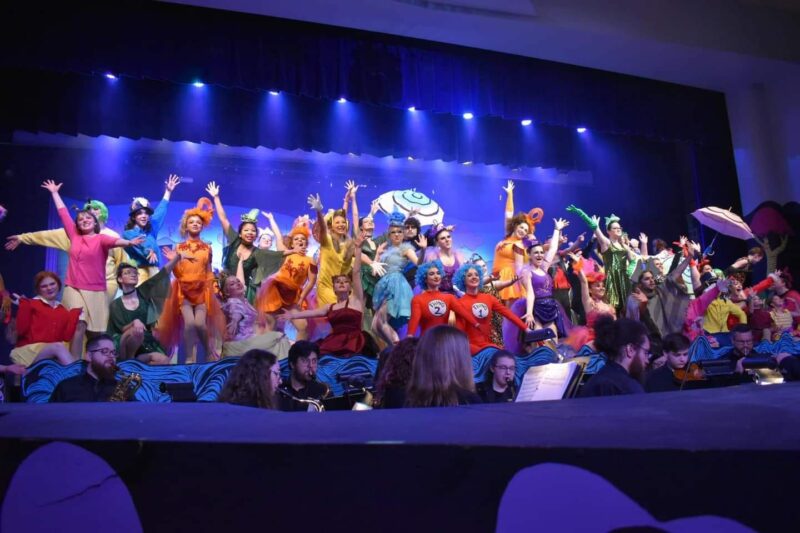
All the world may be a stage, as the great Bard wrote, but when it comes to theatrical productions, it’s often the characters on the stage who determine how that world spins. In the case of the Lynn Ahrens-Stephen Flaherty musical comedy, Seussical, that spin definitely revolves around fun. Even by the standards of whimsical comedies, this one, based on the works of the famed Dr. Seuss, is filled with an abundance of exuberant characters, from Yertle the Turtle and Gertrude McFuzz, to Sour Kangaroo and the Wickersham Brothers, not to mention familiar figures like The Cat in the Hat, and The Grinch.
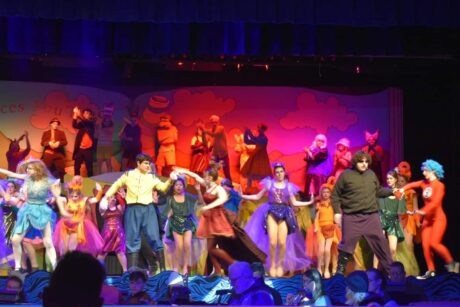 Lighting such colorful characters is fun. Just ask Lighting Designer Christopher Robin who used layered effects and a variety of light angles to bring them and their wonderfully imaginative costumes to life at a recent West Hempfield High School production of the play. “This was just a really enjoyable experience,” said Robin. “The costumes were magnificent, and the set was beautifully painted. Within the set itself, the whole spectrum of color was used. The giant story book on stage gave me free reign to use any color to capture the palette on the pages of Dr. Seuss’s many children books.”
Lighting such colorful characters is fun. Just ask Lighting Designer Christopher Robin who used layered effects and a variety of light angles to bring them and their wonderfully imaginative costumes to life at a recent West Hempfield High School production of the play. “This was just a really enjoyable experience,” said Robin. “The costumes were magnificent, and the set was beautifully painted. Within the set itself, the whole spectrum of color was used. The giant story book on stage gave me free reign to use any color to capture the palette on the pages of Dr. Seuss’s many children books.”
Helping Robin create this color-scape was a collection of CHAUVET Professional fixtures that included 10 COLORado 72 Battens and four Maverick Storm 1 Wash units. Robin originally wanted to place his RGBWA strip lights near the cyc, but limited pipes and positions for rear projections, which were beautifully done by Jesse Madden, made it necessary for him to locate the fixtures on a pipe about five-feet downstage from the cyc.
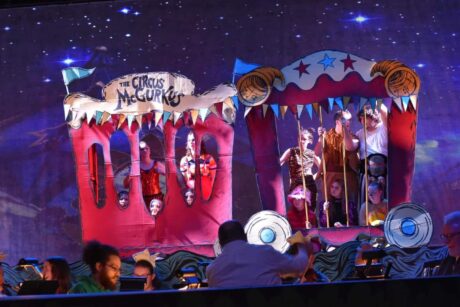 “This wasn’t ideal, and I was nervous of how they were going to play, but I was pleasantly surprised,” said Robin. “I actually was able to use the COLORados as face lights and lighting the cyc, which was actually Dr. Seuss’s Story Book painted upstage. The behavior and smooth gradience of the fixtures gave me many awesome looks playing of the painted set. They were a very important layer in this design and that really helped everything downstage pop that much more.”
“This wasn’t ideal, and I was nervous of how they were going to play, but I was pleasantly surprised,” said Robin. “I actually was able to use the COLORados as face lights and lighting the cyc, which was actually Dr. Seuss’s Story Book painted upstage. The behavior and smooth gradience of the fixtures gave me many awesome looks playing of the painted set. They were a very important layer in this design and that really helped everything downstage pop that much more.”
The Maverick Storm 1 Washes in the rig were placed in tormentor positions that were parallel with the passerelle. Robin relied on them to work with the rig’s projectors to light the mid-stage scrim. “The Storms were my high sides on a downstage electric in front of the projection cyc,” he said. Their color mixing helped me keep my face light uniform and also not bleed on the cyc. Naturally they created beautiful side light looks, which were my favorite in the show.”
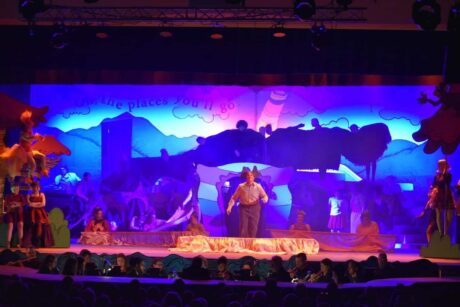 Although Robin unfurled a rainbow during this happy show, he was also careful to control his use of colors so they could be better appreciated. “Layering is everything when you want to use multiple colors at the same time,” he said. “A muddy mess of color never looks good when they are all touching the same surfaces. Balancing back light, side light, and face light starts with positions, and separating my zones from upstage to downstage is how I can get the contrast I need between the colors. This allowed me to create visually pleasing two and three tone looks.”
Although Robin unfurled a rainbow during this happy show, he was also careful to control his use of colors so they could be better appreciated. “Layering is everything when you want to use multiple colors at the same time,” he said. “A muddy mess of color never looks good when they are all touching the same surfaces. Balancing back light, side light, and face light starts with positions, and separating my zones from upstage to downstage is how I can get the contrast I need between the colors. This allowed me to create visually pleasing two and three tone looks.”
Treating black as a color as well, Robin relied on dark space to reflect the occasional menacing moment in the play, and to put space between characters. “I used darkness at times to represent the separation between two characters,” he said. “So close, but yet so far in the world of theatre!”
Still, in the end, it was the abundance of colors, in all their radiant glory, that gave this production its captivating charm, as it reflected the Seussical sense of joy and wonder that lives somewhere inside children of all ages.
Further information from CHAUVET Professional: www.chauvetprofessional.com
